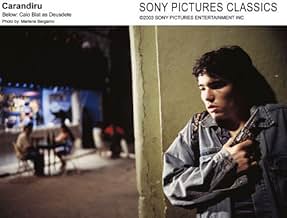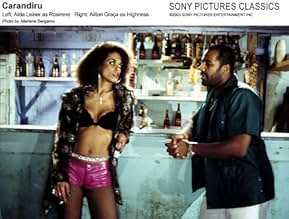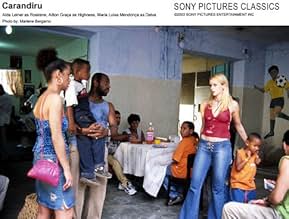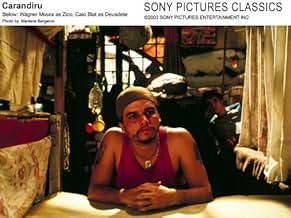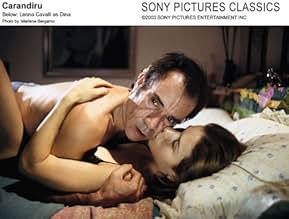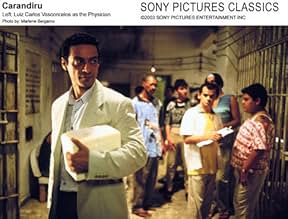AVALIAÇÃO DA IMDb
7,6/10
24 mil
SUA AVALIAÇÃO
Histórias de crime, vingança, amor e amizade na Casa de Detenção de São Paulo, o maior presídio da América Latina.Histórias de crime, vingança, amor e amizade na Casa de Detenção de São Paulo, o maior presídio da América Latina.Histórias de crime, vingança, amor e amizade na Casa de Detenção de São Paulo, o maior presídio da América Latina.
- Direção
- Roteiristas
- Artistas
- Prêmios
- 16 vitórias e 33 indicações no total
Enrique Diaz
- Gilson
- (as Enrique Díaz)
Aida Leiner
- Rosirene
- (as Aída Leiner)
Avaliações em destaque
As a Brazilian, I saw on TV many of the things that happened inside Carandiru, the biggest jail in Brazil and maybe the biggest in Latin America. I can clearly remember the news where we saw the police invasion and the slaughter they made there instead of stopping the prisoners rebellion
I knew this fact would be shown in Hector Babenco's film, but I could never imagine it would be so strongly illustrated. It's pure violence and the audience gets really astonished. Although it's really sad and we can't avoid being sorry for those deaths and suffering, it's impossible not to like the movie. It's excellent.
It's important to say that the invasion is not the only fact that is shown. Actually the book is based in Drauzio Varela's book. Mr. Varela is a doctor who worked in the jail helping the prisoners. The book, that is called "Estação Carandiru" (Carandiru station - because of the underground station that is nearby) is a success in Brazil.
27-year-old Rodrigo Santoro is one of the best actors we have in Brazil nowadays. His talent on Brazilian TV Series have guaranteed him good roles in films made in the country and recently he has started an international career, once he'll be in "Charlie's Angels 2". Some other good actors like Milton Gonçalves and Caio Blat add more positive points to the production. Some others, unknown up to now, showed they'll probably have much success in the future due to their talent, like Lázaro Ramos.
Argentinean Hector Babenco directed 'Carandiru' with a great sense of art, talent and made his film probably the best one of Brazilian cinema this year.
My rate 10/10
I knew this fact would be shown in Hector Babenco's film, but I could never imagine it would be so strongly illustrated. It's pure violence and the audience gets really astonished. Although it's really sad and we can't avoid being sorry for those deaths and suffering, it's impossible not to like the movie. It's excellent.
It's important to say that the invasion is not the only fact that is shown. Actually the book is based in Drauzio Varela's book. Mr. Varela is a doctor who worked in the jail helping the prisoners. The book, that is called "Estação Carandiru" (Carandiru station - because of the underground station that is nearby) is a success in Brazil.
27-year-old Rodrigo Santoro is one of the best actors we have in Brazil nowadays. His talent on Brazilian TV Series have guaranteed him good roles in films made in the country and recently he has started an international career, once he'll be in "Charlie's Angels 2". Some other good actors like Milton Gonçalves and Caio Blat add more positive points to the production. Some others, unknown up to now, showed they'll probably have much success in the future due to their talent, like Lázaro Ramos.
Argentinean Hector Babenco directed 'Carandiru' with a great sense of art, talent and made his film probably the best one of Brazilian cinema this year.
My rate 10/10
'Carandiru' is a film based on the real experiences of Dr Drauzio Varella. He worked in Carandiru prison in Sao Paulo, Brazil, in the late 80s/early 90s carrying out Aids prevention work. During his work he came to know a lot of the inmates closely, and as he was a doctor got to see prison life in a way the other prison workers didn't. He made friends with a lot of the inmates, and learned a lot of their personal stories. The prison is extremely cramped, and the situation came to a climax in 1992. One entire block of the prison fell under prisoner control and a riot squad was sent in, killing 111 men.
The film is being dubbed by some as "this year's City of God", but it's very different to last years Brazillian smash. Where 'City of God' had some very flashy direction and MTV-ized zip-bang editing, 'Carandiru' is pretty straight forward. The film still has some great direction though, Hector Babenco has a leisurely style (matched by his actual output, it's been 7 years since his last film, and nearly 20 since 'Ironweed'), allowing the story the space it needs to breathe but still picking up the pace to build tension. Ironically the only section of the film I didn't really like was the bit that was the most 'City of God'-like. When the doctor is dealing with his patients he asks each one what their story is, and sometimes it's a bit forced, just like in 'City of God' with the "now it's my turn to tell you my story".
Where it's very similar to 'City of God' is it's themes - it's essentially a humanist comedy with a moral edge, dealing with love, hate, revenge, innocence and betrayal. The cons are poor and murderous, but lovable at the same time. If this film and 'City of God' are to believed drug-dealing thieving murderers all have their hearts in the right place and are all okay guys who just took a wrong turn on the road.
There's a bit of a stink being kicked up at the moment on the imdb forum for 'Carandiru'. A lot of Brazillian's are posting, very upset with filmmakers consistently showing Brazil in a negative light. I think that although both films do have that slant to them, they have actually increased interested in the country, and even more so the countries film output, taking it to a global audience. If all Scottish films are to be believed we're all a bunch of Glasweigan Gangster Hardnuts or heroin-addicted thieving murderers too, so I fail to see what the fuss is about.
The director drives home the real point of the film in the last 20 minutes. The overcrowding and in-fighting finally erupts into a full-blown riot that results in the main characters block being taken over by the prisoners. A riot squad enters, and the ensuing rampage is one of the most graphic and genuinely shocking ever committed to film. Definitely not for the faint-of-heart. I remember seeing the prison riot being reported in the UK news, and being appalled at how crowded the prison was, and how a government could let it reach boiling point like that. The last 20 minutes really smacked that home, but with the closing shots of the prison finally being demolished in 2002 you feel like there was at least some sort of closure on the tragedy.
The story is harrowing, but heart-warming, and the acting (mostly from unknowns) is top rate. It's my favorite film of the year so far, but do beware the last 20 minutes, you won't leave the cinema feeling happy.
The film is being dubbed by some as "this year's City of God", but it's very different to last years Brazillian smash. Where 'City of God' had some very flashy direction and MTV-ized zip-bang editing, 'Carandiru' is pretty straight forward. The film still has some great direction though, Hector Babenco has a leisurely style (matched by his actual output, it's been 7 years since his last film, and nearly 20 since 'Ironweed'), allowing the story the space it needs to breathe but still picking up the pace to build tension. Ironically the only section of the film I didn't really like was the bit that was the most 'City of God'-like. When the doctor is dealing with his patients he asks each one what their story is, and sometimes it's a bit forced, just like in 'City of God' with the "now it's my turn to tell you my story".
Where it's very similar to 'City of God' is it's themes - it's essentially a humanist comedy with a moral edge, dealing with love, hate, revenge, innocence and betrayal. The cons are poor and murderous, but lovable at the same time. If this film and 'City of God' are to believed drug-dealing thieving murderers all have their hearts in the right place and are all okay guys who just took a wrong turn on the road.
There's a bit of a stink being kicked up at the moment on the imdb forum for 'Carandiru'. A lot of Brazillian's are posting, very upset with filmmakers consistently showing Brazil in a negative light. I think that although both films do have that slant to them, they have actually increased interested in the country, and even more so the countries film output, taking it to a global audience. If all Scottish films are to be believed we're all a bunch of Glasweigan Gangster Hardnuts or heroin-addicted thieving murderers too, so I fail to see what the fuss is about.
The director drives home the real point of the film in the last 20 minutes. The overcrowding and in-fighting finally erupts into a full-blown riot that results in the main characters block being taken over by the prisoners. A riot squad enters, and the ensuing rampage is one of the most graphic and genuinely shocking ever committed to film. Definitely not for the faint-of-heart. I remember seeing the prison riot being reported in the UK news, and being appalled at how crowded the prison was, and how a government could let it reach boiling point like that. The last 20 minutes really smacked that home, but with the closing shots of the prison finally being demolished in 2002 you feel like there was at least some sort of closure on the tragedy.
The story is harrowing, but heart-warming, and the acting (mostly from unknowns) is top rate. It's my favorite film of the year so far, but do beware the last 20 minutes, you won't leave the cinema feeling happy.
'Carandiru' is a mess, not just the blood flowing over the steps of the infamous São Paulo prison that was razed after a prisoner riot and slaughter in 1992. In 145 minutes, Hector Babenco ('Pixote,' 'Kiss of the Spider Woman') has too many episodes about different inmates that only tangentially and sometimes superficially relate to the central subject of AIDS prevention; frequently they are standard flashbacks to what the prisoners did to merit incarceration. A secondary and successful purpose is to reveal a highly structured prisoner society where justice is swift and not always wrong, where the only mistake is to give in to the civilian authority, at which point any freedoms are lost. Despite the crowded and unsanitary conditions, inmates are usually safer and healthier inside rather than out. The story is told mainly from a prison doctor's point of view as he interviews the inmates for AIDS screening and hears about their lives. Although he is way too happy in his work, he represents a humanistic attitude lacking in the prison officials and the world outside. Homosexuality, while appropriate for any prison tale, seems to dominate the entire long movie (145 minutes) and throw into relief the director/ writer's interest in the subject that began at least in 'Kiss.' One of the most affecting scenes is the marriage of a devoted, physically mismatched couple and the subsequent attempt by the smaller 'husband' to protect his bride. Babenco and the actors manage to relay dignity and gravity in a situation that could be laughable if not at least clichéd. Babenco was inspired to write this screenplay by a doctor who saved his life, a doctor who wrote about his experiences in this prison in 'Carandiru Station.' Although HBO's 'Oz' prison series was more insightful, no account could be as loving and socially concerned. Famous prisoner Oscar Wilde wrote in 'De Profundis,' 'A day in prison on which one does not weep is a day on which one's heart is hard, not a day on which one's heart is happy.' Babenco caught the hard sadness of prison life in 'Carandiru.'
Despite what some reviews and reviewers state, Carandiru is, for the large part, gloriously human and humane, without ever resorting to mawkish sentimentality. The story is based on a real event and when I saw it on TV some years ago and I so much wanted to see it again, I bought the DVD, now cheap.
Yes, these characters are a handful of long-term convicts in one of largest prisons in the world - 7000 of them, in one (in San Pualo, Brazil), that's designed for 'only' 4,000 and we are introduced to them and their frank, matter-of-fact lives as they describe their drug and sex life 'inside' to the wonderfully open and compassionate doctor ( Luiz Carlos Vasconcelos). It's from his perspective as, part of his training, he's thrown into the deep end as he tries to treat and educate prisoners about AIDS.
Amongst the knowing humour, there are tales of anguish, violence and heartache with the main character's stories being run as flashbacks. Most of the crime is petty but circumstance and poverty has dumped most of these damaged people into one huge melting pot, of squalor, STD's and drugs. One finds it surprisingly easy to be open and impartial about situations that could make your toes curl.
Despite the vivid colours used and the Latin music that gets played in and amongst this tapestry of a human jigsaw, where few of the pieces fit, mounting signs reveal an underbelly of unrest, a pressure-cooker that's about to boil over and when it does and armed police march in, the film turns dark, angry and really hits the viewer. I won't say why, though the closing epilogues do (very) partially redress some of what went on.
This is essential Brazilian drama. Gritty, hard-hitting, yes but if you've got the stomach for the excellent City of God, you'll have no trouble here. Buy it, watch it, you'll feel like a proper human being, I promise you.
Yes, these characters are a handful of long-term convicts in one of largest prisons in the world - 7000 of them, in one (in San Pualo, Brazil), that's designed for 'only' 4,000 and we are introduced to them and their frank, matter-of-fact lives as they describe their drug and sex life 'inside' to the wonderfully open and compassionate doctor ( Luiz Carlos Vasconcelos). It's from his perspective as, part of his training, he's thrown into the deep end as he tries to treat and educate prisoners about AIDS.
Amongst the knowing humour, there are tales of anguish, violence and heartache with the main character's stories being run as flashbacks. Most of the crime is petty but circumstance and poverty has dumped most of these damaged people into one huge melting pot, of squalor, STD's and drugs. One finds it surprisingly easy to be open and impartial about situations that could make your toes curl.
Despite the vivid colours used and the Latin music that gets played in and amongst this tapestry of a human jigsaw, where few of the pieces fit, mounting signs reveal an underbelly of unrest, a pressure-cooker that's about to boil over and when it does and armed police march in, the film turns dark, angry and really hits the viewer. I won't say why, though the closing epilogues do (very) partially redress some of what went on.
This is essential Brazilian drama. Gritty, hard-hitting, yes but if you've got the stomach for the excellent City of God, you'll have no trouble here. Buy it, watch it, you'll feel like a proper human being, I promise you.
Carandiru is a a very good film. I think it is not the best Babenco's movie (e.g. not so good as Pixote) but yet it is one of the best film I have seen during this last year.
In the first place, it should be remarked that it needs a lot of courage to put on screen the beautiful and crude Varella´s book on the day-by-day of prisoners of the Sao Paulo jail Carandiru (once the biggest jail on Brazil, now demolished). In particular the movie shows one the the darkest pages in the recent Brazilian history, namely, the massacre occurred in that jail in October 1992: during a rebellion, the police invaded the prison and killed summarily 111 prisoners. Not a single policeman was even injured during the action.
In order to understand the movie, I think is very important to stress how deep has been the relevance of this sad and cruel event in the slow evolution of the Brazilian society towards less barbarian standards. At the time of the massacre most of the elites, media and middle class supported the police action and only ten years later, in 2001, some of the authors of the massacre has been put on trial. In other words the Carandiru tragic facts of 1992 and the way they have been so differently evaluated here during these years, reveals in a tragic fashion one of the most explosive contradiction of the present Brazilian society, in which a large majority of the Brazilians is completely excluded and plundered.
The movie of Babenco show this clearly and powerfully. Babenco used different kind of approaches. Most of the time the tone of the movie is realistic even bordering a documentary, but there are scenes in which the movie becomes visionary.
I am not surprise that the film was not well accepted in the recent Cannes festival. Critics from the first world are not expected to know much about the actual situation of Brazil (euphemisticly speaking). The fact is that Brazil in the USA/Europe imaginary continues to be unfortunately the country of carnival, football and samba and dark crude point of view such as the one of Babenco tend to be considered as disturbing or worst boring. So, while in the preview session for the press in Cannes 2003 most of the comments were "too long", this nearly three hours movie is one most
seen of the year in Brazil.
In the first place, it should be remarked that it needs a lot of courage to put on screen the beautiful and crude Varella´s book on the day-by-day of prisoners of the Sao Paulo jail Carandiru (once the biggest jail on Brazil, now demolished). In particular the movie shows one the the darkest pages in the recent Brazilian history, namely, the massacre occurred in that jail in October 1992: during a rebellion, the police invaded the prison and killed summarily 111 prisoners. Not a single policeman was even injured during the action.
In order to understand the movie, I think is very important to stress how deep has been the relevance of this sad and cruel event in the slow evolution of the Brazilian society towards less barbarian standards. At the time of the massacre most of the elites, media and middle class supported the police action and only ten years later, in 2001, some of the authors of the massacre has been put on trial. In other words the Carandiru tragic facts of 1992 and the way they have been so differently evaluated here during these years, reveals in a tragic fashion one of the most explosive contradiction of the present Brazilian society, in which a large majority of the Brazilians is completely excluded and plundered.
The movie of Babenco show this clearly and powerfully. Babenco used different kind of approaches. Most of the time the tone of the movie is realistic even bordering a documentary, but there are scenes in which the movie becomes visionary.
I am not surprise that the film was not well accepted in the recent Cannes festival. Critics from the first world are not expected to know much about the actual situation of Brazil (euphemisticly speaking). The fact is that Brazil in the USA/Europe imaginary continues to be unfortunately the country of carnival, football and samba and dark crude point of view such as the one of Babenco tend to be considered as disturbing or worst boring. So, while in the preview session for the press in Cannes 2003 most of the comments were "too long", this nearly three hours movie is one most
seen of the year in Brazil.
Você sabia?
- CuriosidadesDr. Dráuzio Varella wrote the original book at the encouragement of a patient he was treating for lymphatic cancer. That very patient happened to be Hector Babenco, who recovered and went on to direct the film adaptation.
- Erros de gravaçãoDuring the riot, as the inmates are running up the stairs of the cell block shortly after the riot squad has entered, one inmate can be seen wearing a T-Shirt of hip-hop group the Wu-Tang Clan. The group only formed in the year the riot took place (1992), and did not release their first widely available album (36 Chambers - Enter the Wu-Tang) until the following year. It is unlikely they would at this time have had a following in Brazil, nor would merchandise be available.
- Citações
Lady Di: I've come to take the test.
Médico - Physician: Please, take a seat. First, I'd like to ask you a few questions, Lady Di.
Lady Di: I've seen this movie before, doctor. I've never needed a blood transfusion and I never pierce my veins. The only drug I use is a joint now and then... when I watch TV or for a little romance.
Médico - Physician: And partners, how many?
Lady Di: Oh, about 2000.
- ConexõesFeatured in 2005 Glitter Awards (2005)
Principais escolhas
Faça login para avaliar e ver a lista de recomendações personalizadas
- How long is Carandiru?Fornecido pela Alexa
Detalhes
- Data de lançamento
- Países de origem
- Central de atendimento oficial
- Idioma
- Também conhecido como
- Carandiru: O Filme
- Locações de filme
- Empresas de produção
- Consulte mais créditos da empresa na IMDbPro
Bilheteria
- Orçamento
- R$ 12.000.000 (estimativa)
- Faturamento bruto nos EUA e Canadá
- US$ 216.335
- Fim de semana de estreia nos EUA e Canadá
- US$ 17.945
- 16 de mai. de 2004
- Faturamento bruto mundial
- US$ 10.781.635
- Tempo de duração2 horas 25 minutos
- Cor
- Mixagem de som
- Proporção
- 1.85 : 1
Contribua para esta página
Sugerir uma alteração ou adicionar conteúdo ausente








